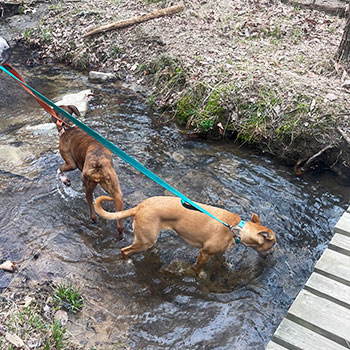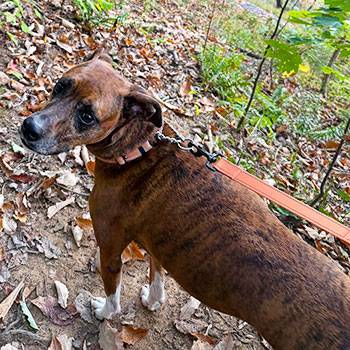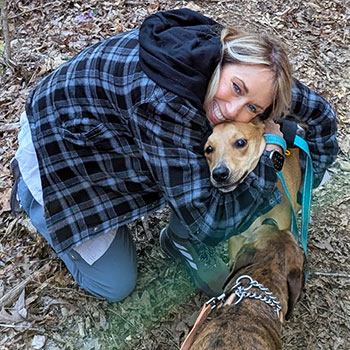Hiking With Your Dog Safely This Fall: Veterinary Tips for Flea, Tick, Lepto and Wildlife Protection

Hiking Safely With Your Dog This Fall
By Dr. Lisa Hillier & Dr. Cheryl O’Neal, Co-Owners | Dr. Merz & Dr. Yokoi | South Forsyth Animal Hospital – Cumming, Georgia
There’s something about Fall in Georgia that makes it perfect for hiking and camping with your dog. The cooler air, colorful leaves, and quiet trails are irresistible—but before you and your pet hit the trails, make sure you’re prepared to keep them safe and healthy.
As veterinarians at South Forsyth Animal Hospital in Cumming, GA, we see many outdoor-loving dogs who face preventable health risks. Here are a few important tips to help protect your pet during hiking season.
🦠 Leptospirosis: A Serious Risk in Natural Water Sources
Leptospirosis is a bacterial infection spread through the urine of wildlife. Dogs can contract it by drinking or wading in contaminated puddles, lakes, or streams. This disease can cause severe kidney and liver damage—and it’s also zoonotic, meaning it can spread to people.

If your dog hikes, swims, or drinks from natural water sources, the Leptospirosis vaccine is essential. It’s a simple way to prevent a serious, sometimes life-threatening illness.
🕷️ Tick-Borne Diseases in North Georgia
Ticks are active year-round in our region and can carry multiple diseases, including:
- Lyme disease
- Ehrlichiosis
- Anaplasmosis
- Rocky Mountain Spotted Fever
For full protection, we recommend Credelio Quattro, a monthly chew that prevents all major tick species, fleas, heartworms, and intestinal parasites. This broad coverage is especially important for hiking dogs who may encounter ticks in wooded or grassy areas.
Dogs who hike regularly or live near wooded trails should also receive the Lyme disease vaccine, which provides an added layer of defense against one of the most common tick-borne illnesses in Georgia.
💧 Hydration & Water Safety
Always bring ample clean water for your dog and a collapsible bowl on every hike. Avoid letting your dog drink from lakes or streams, which may contain Leptospira bacteria or intestinal parasites.
Even when the weather feels cool, dogs can still overheat quickly. Offer water breaks often, and rest in shaded areas when possible.

🐻 Wildlife Awareness: Keep Dogs Leashed
Many areas of North Georgia are home to wildlife, including bears and snakes. Keeping your dog leashed at all times helps prevent dangerous encounters and keeps your pet under control if wildlife appears unexpectedly.
A leash also protects your dog from trail hazards like burrs, porcupines, or cliffs.
🥾 Trail Safety Essentials
Before every adventure, make sure your dog is trail-ready:
✔️ Updated vaccines (including Lepto & Lyme)
✔️ Current flea, tick, and heartworm prevention
✔️ Microchip & ID tags up to date
✔️ First-aid kit and extra poop bags
✔️ Paw check after every hike
🩹 Post-Hike Check and First Aid After every hike
✔️ Check your dog thoroughly for ticks — under the collar, between toes, in armpits, and around the ears.
✔️ Wipe paws clean to remove dirt, allergens, and debris.
✔️ Carry a basic pet first aid kit with antiseptic wipes, tweezers, and bandages for minor scrapes or tick removal.

❤️ Protect Your Hiking Buddy
Exploring nature with your dog is one of the best ways to enjoy Fall in Georgia—but being proactive about their health ensures those adventures stay safe and fun.
If your pet needs Leptospirosis or Lyme vaccines, or you’d like to discuss the best flea and tick prevention for hiking dogs, contact South Forsyth Animal Hospital today.
📍 South Forsyth Animal Hospital
Cumming, Georgia
🐾 Dr. Lisa Hillier & Dr. Cheryl O’Neal, Co-Owners
🐾 Dr. Merz & Dr. Yokoi
📞 Call us at 770-889-0737 or request an appointment online.
At the heart of everything we do is the life of your pet ❤️



